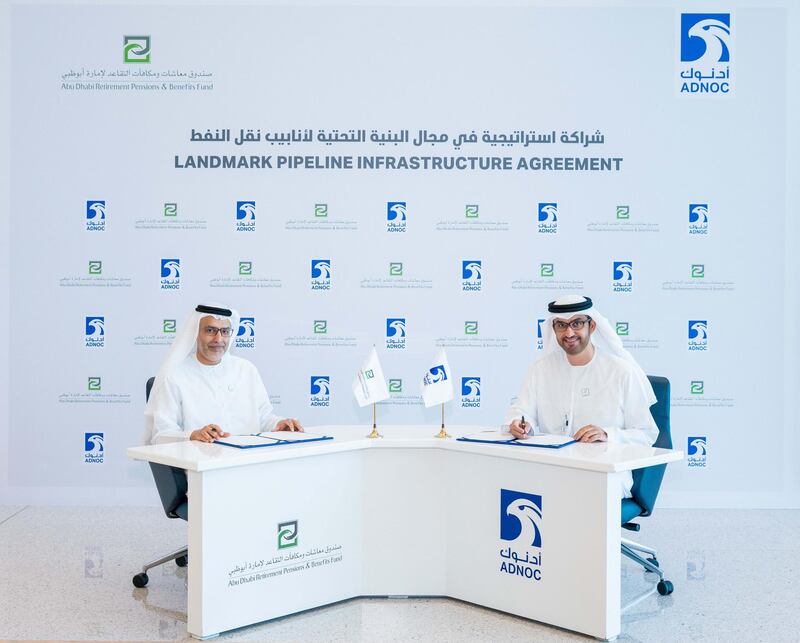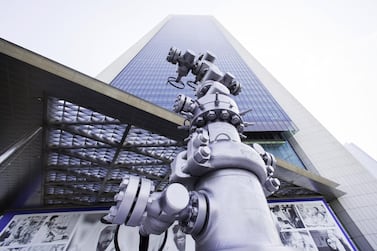Abu Dhabi’s state-backed pension fund is investing Dh1.1 billion in Abu Dhabi National Oil Company’s pipeline infrastructure. The fund joins international private equity companies BlackRock and KKR, who became investors in February.
The deal follows a landmark agreement in February, which saw the world’s biggest asset manager as well as New York-based KKR pay up to $4bn (Dh14.69bn) upfront to lease some of Abu Dhabi’s pipeline assets.
The Abu Dhabi Retirement Pensions and Benefits Fund will acquire a 3 per cent stake in Adnoc Oil Pipelines – the special purpose vehicle (SPV) formed to manage the partnerships and receive tariffs from Adnoc. Following the transaction, BlackRock and KKR will have a 40 per cent stake, with Adnoc holding the remaining 57 per cent.
“This follow-on investment will generate solid, long term value and returns to Abu Dhabi Retirement Pensions and Benefits Fund stakeholders,” said Dr Sultan Al Jaber, Adnoc group chief executive and UAE Minister of State.
In February, Adnoc agreed to lease 18 of its pipelines, spanning a total of 750 kilometres with a capacity of 13 million barrels per day for 23 years to the two investors through the SPV. It marked the first time that foreign institutional investors were invited to back Abu Dhabi's midstream infrastructure.
The pipelines carry stabilised crude and condensate, with the entities receiving tariff for the volume of product transported.
Adnoc retains sovereignty as well as management control of the midstream assets.
Volumes of crude and condensate through the pipelines would remain stable due to minimum volume commitments from Adnoc’s onshore and offshore subsidiaries, which operate 35-year concessions with international oil companies, Adnoc said.
The agreement with the Abu Dhabi pension fund also marked the first time domestic institutional investors put in long-term equity capital into infrastructure assets in the UAE's energy sector.
The fund's chairman Riyad Al Mubarak said the stake acquisition in Adnoc's midstream infrastructure would allow for "greater diversification" of the fund's investments.
“[This] will in turn serve our long term priority of continuous prosperity and financial security of UAE citizens,” he said.
"The fund’s investment portfolio is allocated to investments in the local market based on long term and low-risk investment returns,” he added.
Adnoc, which produces much of the UAE's oil, has embarked on an increasingly commercial business strategy since early 2016, when Dr Al Jaber became chief executive. The group has listed a stake in its fuel retail arm and positioned itself to leverage more value with the addition of downstream capacities at home and abroad. It has also brought outside partners –Italy's Eni and Austria's OMV – into its refining subsidiary.
The pipelines transaction, which awaits regulatory approvals and customary closing conditions, is expected to be finalised in the fourth quarter of 2019, Adnoc said.
Proceeds from the pipeline infrastructure deal could be used in future projects or as part of dividends paid to the Abu Dhabi government - its sole shareholder. This transaction, as well as Adnoc’s issuance of a $3bn bond on behalf of a pipeline subsidiary in 2017, form part of a strategy to help the company mitigate the cyclical nature of the sector, especially volatile oil prices. Such deals also help the government with fiscal planning as Adnoc would be able to, at least in the near-term, pay dividends to its shareholder.
Blackrock and KKR invested in Adnoc’s pipeline assets through two of their energy funds.
BlackRock, which has almost $6 trillion in assets under management, channelled its investment through its third Global Energy & Power Infrastructure Fund.
KKR on the other hand made its first direct investment in the region through its $7.4bn Global Infrastructure Investors Fund.
The New York company has been picking up pipeline assets in the North and Central Americas, including in the Gulf of Mexico, DJ Basin, Canada's British Colombia and Alberta Montney regions, as well as Mexico's Bay of Campeche.








